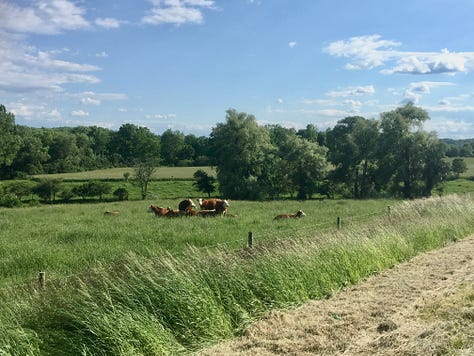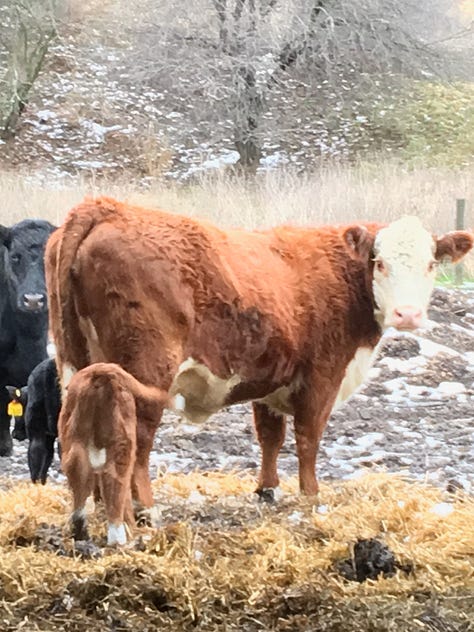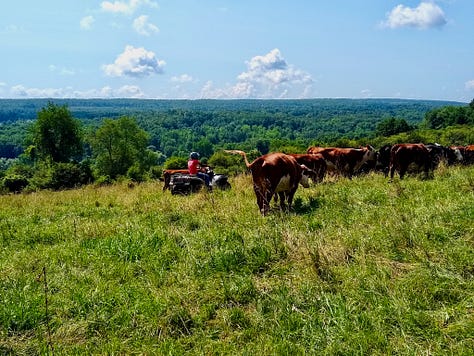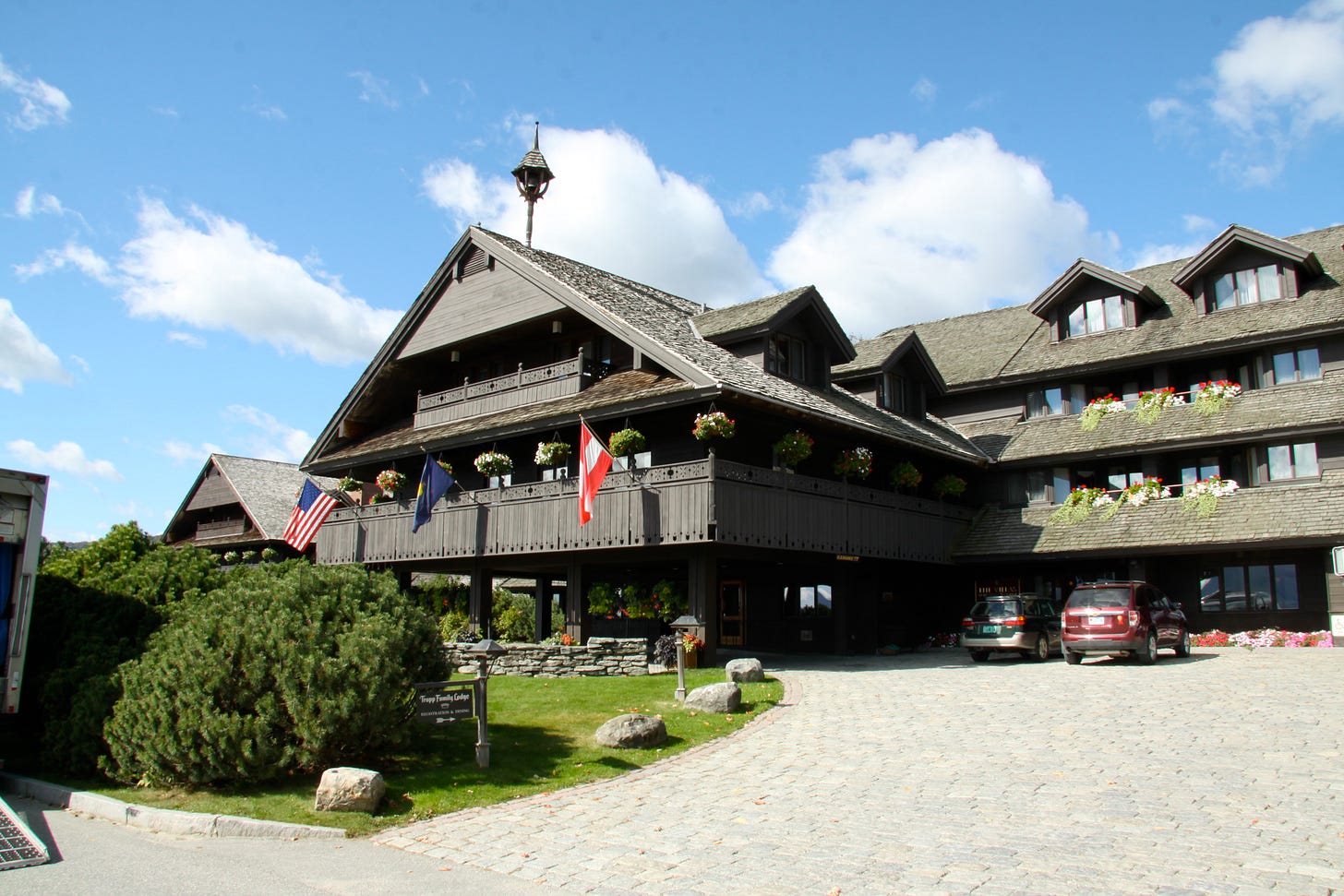Stormy weather
Yesterday was one of those days that felt like three different days in one. In the morning, I had to go to Somerset to take care of a couple things, during which I got caught in a torrential rainstorm. That cleared by the time I got home, so I did a few chores and ate some lunch. Then another round of storms blew directly over my house. That threw me—and my dog Nino—completely off our game. My capacity to cope with storms has expanded since 2022, but I imagine few among us are perfectly placid when a lightning strike shakes their entire house.
I suspect I was also hypersensitized to the weather by the podcast I listened to as I drove to and from Somerset. Entitled Floodlines, it explores myriad aspects of Hurricane Katrina, from forecasting to news coverage to the wildly insufficient government response. It was a lot to take in, with or without a storm-filled day.
Evening came and I realized I had not written much of anything. I started kicking myself, then realized I had been listening to Floodlines because I suspected that it would help me with the chapter I’m currently writing, and I could already feel myself processing what I’d learned. That, and the lightning strikes had left me with that almost hollow feeling one gets after an unexpectedly intense event, however brief and ultimately unthreatening it may have been.
So, I decided to scan more of Ruth’s columns, hoping to get through the rest of the year 2000. I made it, and in the mix, I found this gem from December 10. If you’ve ever puzzled over what it means to “tell the story only you can tell,”1 well, I feel pretty sure no one but Ruth could tell a story that seamlessly interweaves The Sound of Music, teenage memories, an autographed book, freelance journalism, and Hereford cattle.



Rural Reflections
By Ruth Dennis
The rest of the ‘Sound of Music’ story
One of the current TV holiday specials will be the film version of “Sound of Music,” in observance of its 35th anniversary, which is on tonight. Watching the promotion of Julie Andrews running and singing about the hills being alive with the sound of music, I made plans to include this on my TV schedule. It would make no difference that I have watched it countless times before. There will be much to remember, much more than just the film.
I remember reading Maria von Trapp's “Family on Wheels”2 and “Maria” which told her story—a story that we would all come to know when “Sound of Music” became a long-running musical on Broadway. I can close my eyes and remember seeing this same Broadway show in New York City.
I have seen the film version so many times that I am no longer aware of additions or changes to the film from the stage version. I am still caught up in the romance, the comedy and the impending tragedy that is only denied with the family's escape from Nazi Germany. And that in itself is the basis for a dim memory or two when as a teenager I was becoming aware of the threats of Hitler and his regime.3 The radio newscasts and the movie news reels showed some of the changes taking place in Germany and hinted strongly about dangers to come.
The Rodgers and Hammerstein music keeps “The Sound of Music” fresh no matter how many times we see a community theater or school production. One of my favorites continues to be “Sixteen Going On Seventeen.” Maybe that's because I have granddaughters who “have been there” not too long ago. And no one can forget the musical scale after hearing “Do Re, Mi.”
But the announcement of the TV anniversary showing of “The Sound of Music” evoked many other memories. The musical ends with the family leaving their home. There is much more to the story as the von Trapp family became “A Family on Wheels” singing in concert halls across Europe and then the United States. Much of this is told in Maria von Trapp’s books which also tell of the family settling in Stowe, Vt., where they built the von Trapp Family Lodge.
I can close my eyes and see Maria von Trapp as she came into the shop and restaurant adjacent to the Lodge and personally greeted each of us. My husband and I were returning from our annual September vacation in Maine and had encouraged new friends we had made to come with us to Stowe for a few days. We had made a brief stop there a few years earlier but there was much we wanted to see and do. The four of us stopped at the restaurant for “dessert and coffee.” I can remember how overwhelmed we were when the dessert cart was brought to us to select our choices.
Our waitress was not one of the von Trapp family, but she told us that the Baroness was expected to come in within the next half-hour or so. We reveled in pastries heaped with whipped cream and fruits and the ambience that abounded throughout the small building.
And then, there was the unexpected and never to be forgotten opportunity to meet “Maria.” She spoke to each of us, responded to comments of mine about one of her books. I told her I had bought her newest book, “Yesterday, Today and Forever” from the bookstore section when we came in. She asked me to give it to her so that she could personally autograph it. I have treasured that book with its simple message “to Ruth” for so many years.
Our friendship that began in Maine and included that afternoon with Maria von Trapp has lasted over the years, although in the most recent ones it has been limited to the exchange of Christmas greetings between Pine Island, Fla., and Jasper. We, my husband and I, often talked of returning to Stowe and staying at the von Trapp Lodge.4 We never did, but other friends of our have and shared that experience with us.
Several years later I read that the Lodge had been destroyed by fire. I sent a note to Maria von Trapp, never expecting anything except to be one of the millions who could have some small sense of the loss. To my surprise, several months later I received a thank you for my note with the Baroness’ personal signature.
The TV program announcement stirred still another von Trapp / “Sound of Music” memory—one that never was fulfilled.
My husband and I were freelance writers given special assignments by “The American Hereford Journal” to do feature articles about purebred Hereford breeders in the Northeast and Mid-Atlantic States. Our editor called us one day, excited about a possible feature assignment to interview “a von Trapp in Stowe, Vt., who has just joined the American Hereford Association.”
When asked if we wanted such an assignment, we were quick to accept. Our editor promised to make inquiry as to whether this was one of “the von Trapps” and the extent of the Hereford involvement, and then tell us if this would be a feature assignment. We did not hear for more than two months—not until in answer to a letter to the magazine headquarters in Kansas City did we learn that our editor had died suddenly of a heart attack. And, the new editor was not interested in a feature from Stowe, Vt., even if it was about “a von Trapp.”
“The Sound of Music”—yes, I will be watching it once again as part of the holiday offerings. I will remember the story, the music, even before I see and hear it. I will remember so much more as well.

I see this phrase all the time, and wanted to find a correct attribution. The closest I’ve come so far is Neil Gaiman: “As quickly as you can, start telling the stories that only you can tell – because there will always be better writers than you, there will always be smarter writers than you, but you are the only you.” That’s awfully recent though, 2017 I think, and the phrase feels older than that. If you know a better attribution, please let me know!
I remember having a copy of this book!
Ruth writes about this in a column that includes her (re)discovery of her 1939 diary.
#goals



